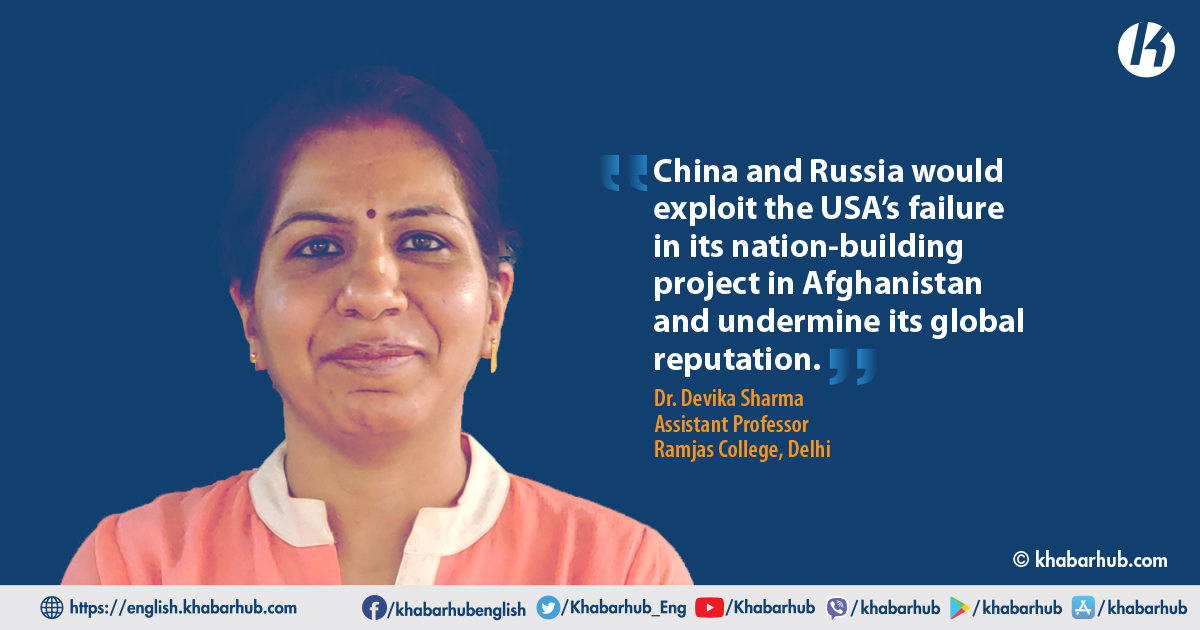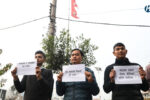The recent Taliban takeover of Afghanistan has been swift and has brought in its wake disastrous consequences for Afghan polity, society and economy.
Not only that, the world as a whole seems to be reeling under the impact of the occurrence and is cautiously assessing the evolving situation.
While the obvious outcomes include a severe humanitarian crisis, worst affecting minorities and women with adverse consequences for their safety and rights, a deepening of the refugee problem with large numbers of Afghans fleeing their country and Europe, in particular, aiming at preventing a repeat of the Syrian refugee crisis.
The regional and global security implications and emerging diplomatic challenges also demand attention.
The US Debacle
The sudden US withdrawal from Afghanistan fuelling the Taliban’s seizure of power shows the superpower in poor light.
It is being construed as a tactical mistake and a strategic failure since America’s pulling out of the country appears ill-planned and speedy, leaving in the lurch the Afghan security personnel, women and locals who were relying on US support.
Joe Biden, instead of correcting the wrong done by his predecessor in deciding to withdraw completely from Afghanistan, went a step further and realized it.
A safer bet would have been to continue to maintain a minimal armed presence in Afghanistan to assist the Afghans in their fight against terror and receive in the bargain, Afghan cooperation in America’s anti-terrorism crusade.
The unfolding occurrences have reinforced the international opinion that the superpower status of the USA has taken a beating. Thus, the USA faces the serious challenge of winning the global community’s dwindling confidence in the sanctity of its claims about foreign armed intervention.
An allied strategy of using the diplomatic route to advocate negotiations and dialogue would have served to buttress the campaign further.
In hindsight, the USA’s nation-building campaign in Afghanistan, spanning twenty years and involving an expenditure of about USD 2 trillion seems to have gone in vain.
This is evident from the fact that the Afghan President had to flee the country and the USA itself has been engaged in mammoth efforts at safely evacuating people from the war-torn country.
However, in keeping with the US President’s view of upholding their national security interest by pulling out of Afghanistan has been met, but at the cost of Afghanistan’s national interest.
The US withdrew from Afghanistan in keeping with the unsound Doha Agreement of 2020 that raised questions over the Afghan military support to the American military intervention in Afghanistan.
President Biden decided to pull out unconditionally, even though the Taliban did not honor the agreement from their side.
This gives rise to doubts about the commitment of the USA towards Afghanistan, in not batting an eyelid before making their way out hastily from that country without considering the consequences.
No doubt, the US withdrawal from Afghanistan has been long overdue, however, the manner in which it has been accomplished is questionable, somewhat of a betrayal towards the Afghans who had been long-standing US partners in their counter-terrorism initiatives.
It has tarnished the superpower’s global image. However, the USA can still reclaim its lost reputation by continuing to support and demonstrate solidarity towards those who have been its allies in the war against terror and helping them to reconstruct their lost paradise.
This will determine the future of US-Afghan relations and will also put to test the credibility of the superpower in lending a helping hand to their Afghan collaborators who are facing rough weather back home.
The nature of the US withdrawal has not just adversely affected its global standing but has jeopardized its security interests in South Asia as well.
The situation, as it has evolved in Afghanistan, represents the severe breakdown of the negotiations spearheaded by the USA with the Taliban, leaving the superpower on a weak wicket to deal with the fast-emerging circumstances.
The wavering faith of the international community in the intentions of the USA has been vindicated and it is being characterized as undependable.
Its tall claims of consistently waging an offensive against global terrorism, both through military and non-military means have been proved hollow.
The unfolding occurrences have reinforced the international opinion that the superpower status of the USA has taken a beating. Thus, the USA faces the serious challenge of winning the global community’s dwindling confidence in the sanctity of its claims about foreign armed intervention.
However, President Biden cannot be held solely accountable for the unfortunate turn of events in Afghanistan. It can be perceived as the culmination of two decades of ill-conceived and miscalculated policy.
By pulling out of Afghanistan without devising a proper strategy or evaluating what lies ahead, the superpower has not just served to plunge the future of Afghanistan into darkness but has endangered its interests on multiple counts.
The nation-building campaign launched by the superpower in Afghanistan was predicated on their vision and not that of the Afghans and was, therefore, not grounded in the reality of local conditions.
There was a yawning gulf between Afghanistan envisaged by American policy experts and the rickety institutions that were being established in reality.
Their collapse was imminent. The USA, in the ultimate analysis, seems to have been more concerned about dealing with the threat posed by China, and its continued military engagement in Afghanistan appeared to be an aberration from that objective.
Sadly, the Afghans have been taken for a ride not just by outsiders who promised to fight for their cause but by their own leadership on whom they reposed their unflinching faith. We are witnessing the making of ‘Talibanistan’.
Ramifications for the USA: ‘As you sow, so shall you reap’.
By pulling out of Afghanistan without devising a proper strategy or evaluating what lies ahead, the superpower has not just served to plunge the future of Afghanistan into darkness but has endangered its interests on multiple counts.
The security interests of the USA face a graver risk with the Taliban in-charge of Afghanistan. The Taliban has evolved to a great extent since the 1990s, is abreast with the latest technology, which is employed in remotely bringing new terrorists into its fold by its members who are well versed with technology.
This scenario poses security challenges even more dangerous than the 9/11 attacks on the USA in 2001. The USA needs to take stock of the situation and reorient its security policy in line with these renewed threats.
The haphazard US retreat is likely to bring in its wake significant strategic results and will call into question the super power’s foreign policy. As it appears, ‘all is not well’ for the superpower.
It would entail factoring in the impact of the Taliban takeover on the US-China struggle for supremacy, the strategic moves of regional powers in consonance with their national interests, and how the USA scrambles to once again exert regional influence in South Asia as also gain access to rare natural resources in Afghanistan.
The fall of Kabul into the hands of the Taliban creates fertile ground for Afghanistan to once again become a safe haven for terrorists.
The Afghan territory may be used to design and execute terrorist attacks against the USA and its global partners.
China and Russia would exploit the USA’s failure in its nation-building project in Afghanistan and undermine its global reputation.
China, Russia and Iran are set to fill the void left by the USA and increase their influence in South and Central Asia. Great power games would ensue.
The Taliban’s success would be portrayed by China as the most recent example to vindicate its discourse of American failure.
The haphazard US retreat is likely to bring in its wake significant strategic results and will call into question the super power’s foreign policy. As it appears, ‘all is not well’ for the superpower.
(Dr. Devika Sharma is an Assistant Professor, Department of Political Science, Ramjas College, University of Delhi)









Comment